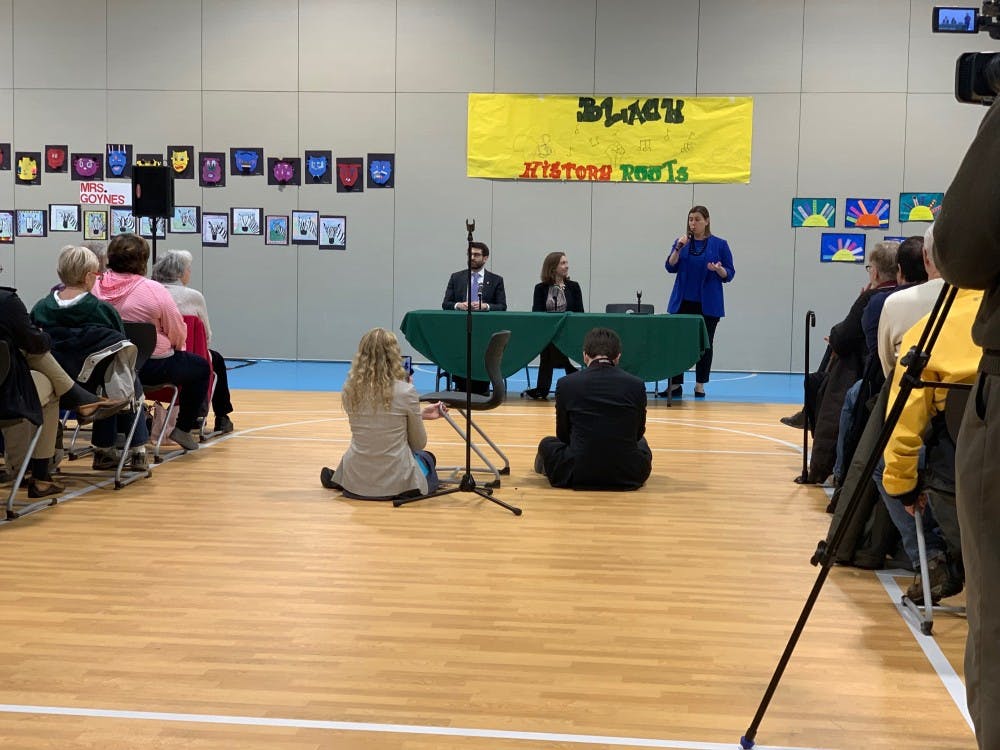Got corporate money in politics? Maybe not for long.
H.R. 1, or the “For The People Act of 2019,” has passed the House with bipartisan support.

Behind table, from left to right: Michigan Secretary of State legal policy director Jonathan Brater, End Citizens United president Tiffany Muller and U.S. Rep. Elissa Slotkin, D-Michigan, discuss H.R. 1, to limit corporate financial influence in politics, at a public forum at Lansing's Pattengill Biotechnical Magnet School March 15, 2019. Photo by S.F. McGlone
—Got corporate money in politics? Maybe not for long.
H.R. 1, or the “For The People Act of 2019,” has passed the House with bipartisan support.
The bill is aimed at not only overturning Citizens United — a 2010 Supreme Court decision that equated political spending with political speech, eliminating restrictions on corporate issue advertisement spending — but also at making voting easier and addressing 21st-century ethics concerns.
In a public forum at Lansing's Pattengill Biotechnical Magnet School Friday, Rep. Elissa Slotkin, D-Michigan, explained her support for the bill. She was joined by End Citizens United president Tiffany Muller and Michigan Secretary of State legal policy director Jonathan Brater.
Slotkin said this past summer, before the November 2018 midterm elections, political disillusionment from MSU students over corporate funding was a major factor in her support of the bill.
“Michigan State students were telling me in droves that they weren’t going to vote in their first election or their second election," she said. "As a national security professional — as someone whose entire family is in service — that just made my heart drop."
Slotkin said MSU students helped her “get smart” on campaign finance. Students told her they no longer had faith in the democratic process due to “big money in politics.”
The congresswoman said the healthcare industry was commonly cited as an example of corporate interests undermining the interests of voters. Slotkin also mentioned pharmaceutical companies doing this, an issue she has already taken action on.
"For me, it just became a very strong signal from the district that they wanted real reform,” she said. “So myself and a few candidates across the country began running on bringing integrity back to the government.”
Slotkin said it was equally important to hear from students on campaign finance issues just as their opinions were sought on immigration or the environment, because campaign finance was central to many other issues in Congress.
Before she was elected, Slotkin and 100 other candidates for the House of Representatives signed a letter to Democratic leaders saying that if they flipped the House, a sweeping anti-corruption bill would be the first bill of the new Congress.
And it was. H.R. 1 was introduced in the House Jan. 3 and passed the chamber March 8.
“For me, it’s about disclosing big money in politics so you can’t secretly and anonymously donate money,” Slotkin said, describing what she believes to be the most important aspects of the bill. “It’s about government ethics and about holding those of us who are elected to a higher standard. It’s about stopping that chain that goes from elected official to lobbyist and back.”
She introduced an amendment that states foreign entities cannot buy advertisements on television or social media to influence voters. This was a direct reference to Russian interference in the 2016 presidential race.
“In researching and working on the amendment, we went through the ads that were targeted at Michigan — the social media ads in particular that were bought by Russian entities,” Slotkin said. “They are divisive; they are meant to pit us against each other.”
She recalled during her time with the CIA and Pentagon that this method was from a “playbook” used by Russians to destabilize communities across eastern Europe.
12:20 Muller, of End Citizens United, said reform legislation like H.R. 1 is more popular than ever. She said only 7 percent of the country believes the government is working for them rather than “big interests.”
Since 2008, two years before the Supreme Court ruled in favor of Citizens United, outside money in politics has gone up 1,000 percent, according to Muller. In addition, 71 percent of campaign contributions in 2018 were donated by less than 1 percent of the population.
“That's not democracy. That's not one voice, one vote,” Muller said.
Muller summarized the bill, saying it would ensure an increase in voting access and make Election Day a national holiday. It would also limit loopholes in barring members of Congress from serving on corporate boards and require all sums of money spent or donated in the political process to be disclosed.
Support student media! Please consider donating to The State News and help fund the future of journalism.
Michigan voters made some progress in this regard by passing Proposal 3 in November, Brater said.